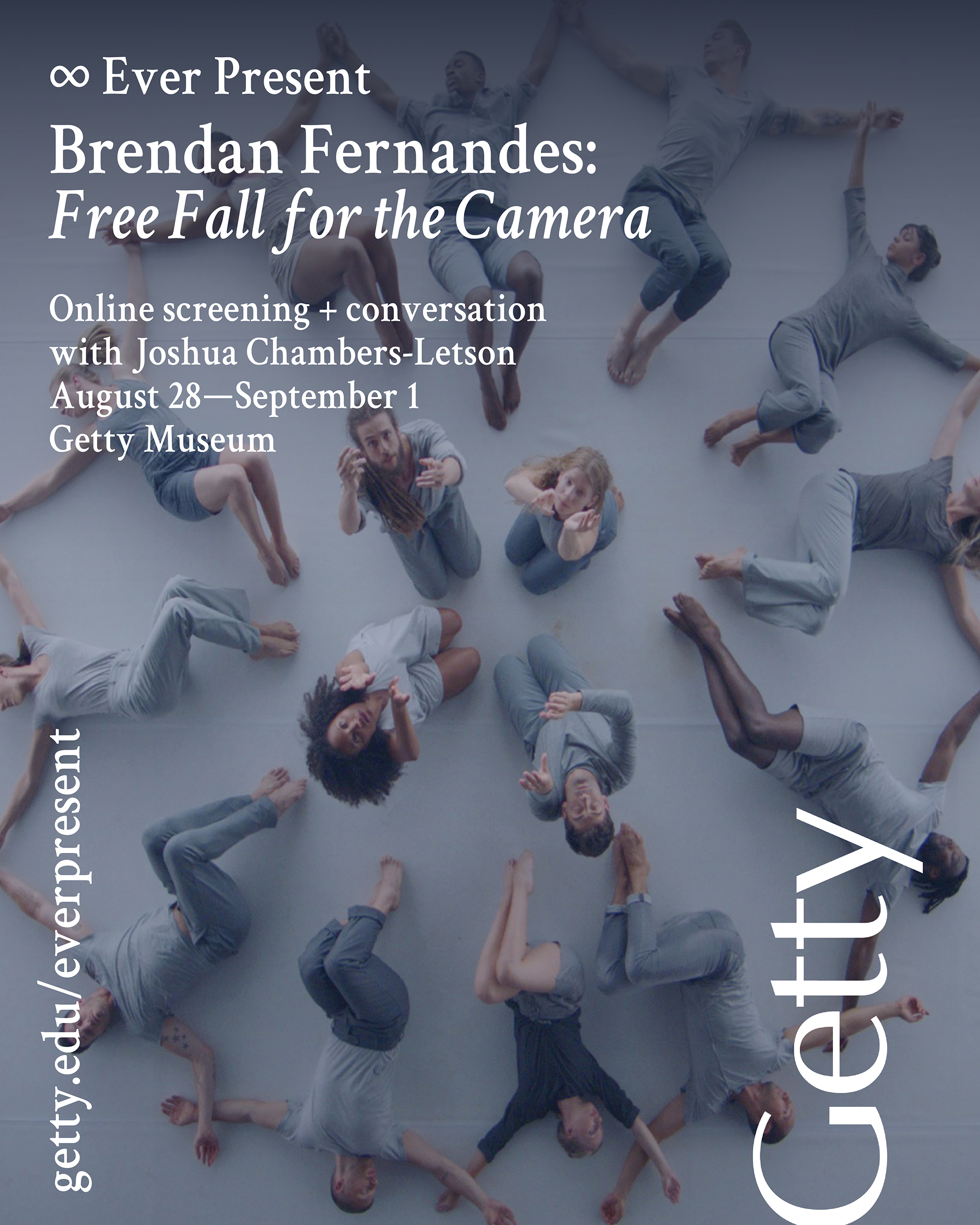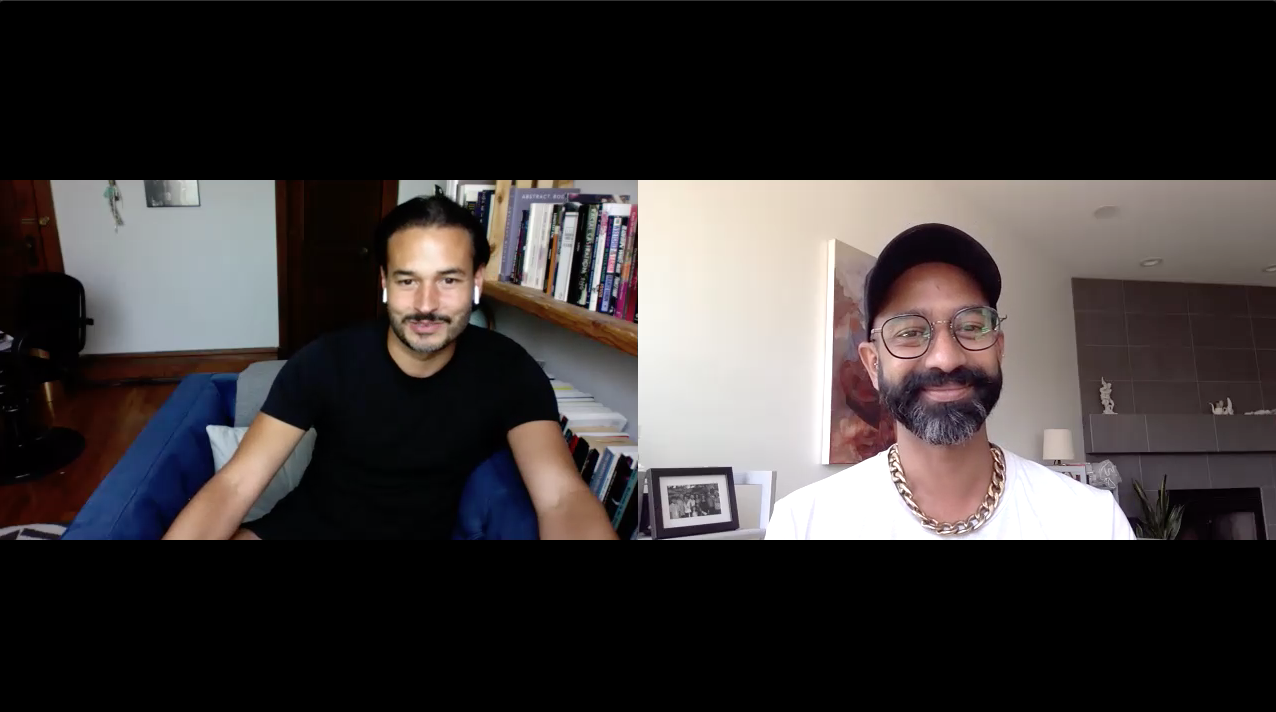

Online screening, followed by a conversation between the artist and Joshua Chambers-Letson, associate professor of performances studies, Northwestern University
August 28—September 1, 2020
Join us online for the premiere of Free Fall for the Camera, a new short film by artist Brendan Fernandes. Using sculpture, drawing, and performance to investigate power dynamics embedded within the practice and history of dance, Fernandes' work addresses issues of race, queer culture, migration, protest and other forms of collective movement. Always looking to create new spaces and new forms of agency, his projects take on hybrid forms: part ballet, part queer dancehall, part political protest, and always rooted in collaboration and fostering solidarity.
In Free Fall for the Camera, an ensemble of dancers create kaleidoscopic moments that serve as remembrances of the lives lost in the tragic 2016 mass shooting at Pulse nightclub in Orlando, which targeted the Latinx and LGBTQ+ community. The film evolved from elements in Free Fall 49, a site-specific performance Fernandes presented at the Getty Center in June 2017. A feat of endurance across three hours, eight dancers on raised platforms scattered across the museum courtyard emulated the movements of club dancing as music lured the audience into a dance party. At random, startling intervals, the music suddenly stopped and the dancers fell to the ground, snapping the crowd out of the present into a stark state of reflection. This was repeated 49 times—each a moment of silence for the victims of the Orlando shooting. These "unmistakable moments of memorial and resurrection," reported Frieze magazine, were actions that took on a "dual meaning, comprising both people of color living in the spectre of seemingly random physical violence but also, perhaps, queers of colour hitting back."
Now in 2020, four years have passed since the tragedy in Orlando, yet national conversations surrounding intolerance and acts of violence against difference have only intensified. After the screening, Fernandes will discuss the project with Joshua Chambers-Letson, a writer and performance theorist based out of Northwestern University, who researches and teaches courses in performance studies, critical race theory, political theory, and queer of color critique.
Brendan Fernandes (b. 1979, Nairobi, Kenya) is an internationally recognized Canadian artist working at the intersection of dance and visual arts. Currently based out of Chicago, his projects have been shown at the 2019 Whitney Biennial (New York); the Solomon R. Guggenheim Museum (New York); the Museum of Modern Art (New York); the Getty Museum (Los Angeles); the National Gallery of Canada (Ottawa); MAC (Montreal); among a great many others. He is currently artist-in-residence and faculty at Northwestern University and represented by Monique Meloche Gallery in Chicago. Recent and upcoming projects include performances and solo presentations at the Noguchi Museum (New York); Monique Meloche Gallery (Chicago); the Art Gallery of Ontario (Toronto); and the Museo De Arte São Paulo (São Paulo). www.brendanfernandes.ca
Joshua Chambers-Letson is a writer and performance theorist who researches and teaches courses in performance studies, critical race theory, political theory, and queer of color critique. He is the author of After the Party: A Manifesto for Queer of Color Life (NYU Press, 2018) and A Race So Different: Law and Performance in Asian America (NYU Press, 2013—winner of ATHE’s Outstanding Book Award in 2014). His academic writing has appeared in edited volumes and journals including Social Text, Political Theory, Criticism, Cultural Studies, MELUS, and women & performance. His art writing has appeared in catalogues for Teching Hsieh’s exhibition at the 2017 Venice Biennale and the Chrysler Museum/Grey Art Gallery’s exhibition Tseng Kwong Chi: Performing for the Camera, as well as in Dirty Looks, The Brooklyn Rail, ASAP/J, and the Walker Reader. With Ann Pellegrini and Tavia Nyong’o he is a co-editor of the Sexual Cultures series at NYU Press. He received his PhD from New York University in 2009 and was a postdoctoral fellow at Wesleyan University’s Center for the Humanities from 2009–2010.
